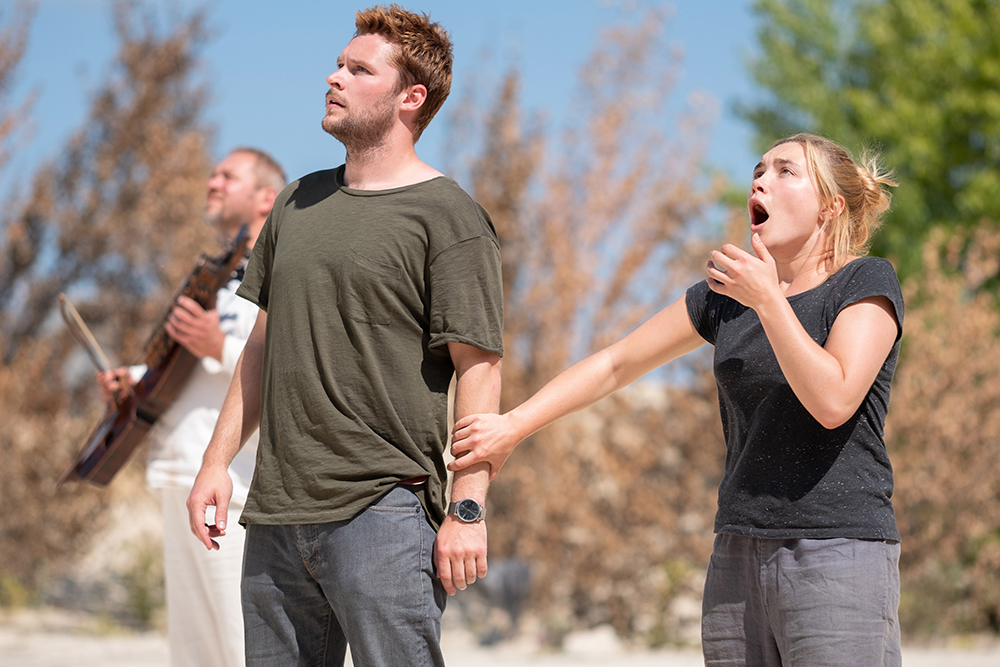Midsommar

Jack Reynor, Florence Pugh Photo by Gabor Kotschy, Courtesy of A24
The construct of horror often begins with something out of place. In Ari Aster’s sophomore film, the writer/director returns to familiar themes of isolation, guilt, grief, and yet what’s out of place has, again, nothing to do with any of these. Raised in New York, perhaps influenced by the mysticism underlying his parents’ Judaism, Aster seems fascinated with atavistic, if a bit overworked, dread. Like HEREDITARY, MIDSOMMAR begins with a family tragedy ultimately tied to some larger, sinister purpose.
A remake of the 2003 Danish film directed by Carsten Myllerup, the film opens on a Scandinavian tableaux. Following the sudden and unexpected murder-suicide of her mentally ill sister and their parents, Dani (Florence Pugh), a psychology major attending university, hitches onto her boyfriend Christian’s (Jack Reynor) travel plans. Christian’s friends see this as an intrusion on their opportunity to woo Sweden’s finest women. A friend and exchange student from the Scandinavian countryside, Pelle (Vilhelm Blomgren), persuades Christian, Mark (Will Poulter), and Josh (William Jackson Harper), to set out to the rural, Swedish village of Hårga¹, some 300km north of Stockholm, during the week of midsummer—the summer solstice.
In the province of Hålsingland, before their destination the group pauses on a hilltop to partake of local hallucinogenics. The trees appear to “breathe” as the gang’s thoughts drift under a perpetually-lit midnight sun. Upon arrival in the village, they’re greeted by song and music—suspiciously resembling a Shepard tone.
Purpose appears as a recurring motif. At the beginning of the trip, aimless in his studies, Christian borrows from Josh’s thesis about the locals. Dani searches for respite from her grief. As the solstice ceremonies commence, Dani’s breakdowns give way to dreams and contemplations. Visible early in the film, bedsheets and wall coverings in her parents’ house, as well as a painting gifted to Dani, suggest an ancestral connection to this place. One of them finds meaning out of all this, but not in the way you think. You could say the writing is literally on the wall(s).
Unlike HEREDITARY, a narrative sequence through which a straight line can be drawn, MIDSOMMAR vaguely attempts to weave together several threads. The plot depends heavily on an impromptu motivation for a lengthy trip, Dani’s serendipitous decision to embark with Christian and friends, and the unexplained family tragedy—pay close attention to the use of color².
Sometimes adaptations work. Sometimes not. Whether for topicality or sensationalism, Aster rewrites Christian’s sister into a girlfriend, Danes into Americans. Driving the bridge from Copenhagen to Malmö makes much more sense than five college students spending, at minimum, $500 airfare each only to rent a car for a half-day drive from Stockholm into the middle of nowhere. On the one hand Aster fleshes out a more elaborate story than your standard dead-sister’s-ghost-ruins-your-vacation plot. On the other, it’s unclear whether Aster can manage all the details he’s added. Aster’s MIDSOMMAR is substantively different from its predecessor, but not as coherent a vision as Guadagnino’s re-imagining of Dario Argento’s SUSPIRIA.
Still, it’s interestingly done. The students comments often manifest as off-camera voice overs, as though we’re hearing their thoughts. The original focuses on supernatural horror—everything from a character deep into reading The Celestine Prophecy to the sister’s relentless haunting of her brother. Here, we see rituals, presided over by strange elders including the famous Swedish actor Björn Andrèsen (DEATH IN VENICE), but all of the horrors are explicable, if somewhat loosely. One of the girls casts a “love spell” involving some ingredients I won’t name—not because they’re spoilers but because laptops cost money and it’d be a shame if you vomited all over yours. It’s established by the trippy pitstop that psychotropics are abundant in the region. In a sense, it’s a movie about date rape, but with male victims. But it’s not a revenge film. The twist turns cultural and gender roles on their heads, de-normalizing the act, so we can see it for what it is.
Of greatest import, perhaps, are the performances by Poulter and Pugh. Both British actors, their take on American coeds is stunningly accurate. Mark’s deadpan quips arise out of cynicism not malice. Dani’s emotional outbursts aren’t the hysterics common to women’s roles. Visceral paroxysms of grief—that sort of hyperventilating wail over the phone telegraphing Dani’s state of mind—indelibly linger in ours.
Yet for all its inventiveness and ambition, MIDSOMMAR falls back on tropes—the duplicitous villagers (read: cult) that lures in outsiders for nefarious purposes, the college students plied by drugs and alcohol, the disfigured oracle or otherwise magical person (I’ve never found anything magical about my cerebral palsy, but ok), and the Building No One Is Permitted to Enter But Someone Will Anyway.
Earlier in the film, Pelle mentions, rather peculiarly, that he’s known his brother for as long as he can remember. He also empathizes with Dani’s loss, saying that his parents died in a fire. By the end of this film, those two statements taken together suggest something more unsettling about this place than all of the grotesqueries we actually witness.
- I’m surprised to discover that Hårga is a real place. There’s an annual, provincial festival that celebrates the traditional dance, the Hambo. IMDb reports that none of the location shoots were done in Sweden, however. It’s patently obvious why.
- There are several coincidences between the death of Dani’s parents and a particular rite of passage in the film. However, it feels as though a scene or two might have been snipped, rendering these connections too loose. Consequently, not only does it cast a negative light on mental illness but it fails Roger Ebert’s First Rule of Symbolism, “If you have to ask what it symbolizes, it didn’t.”